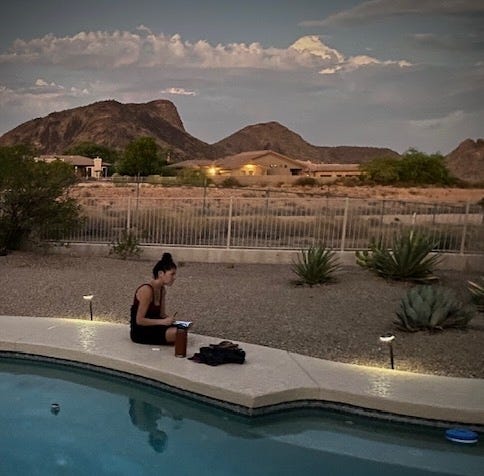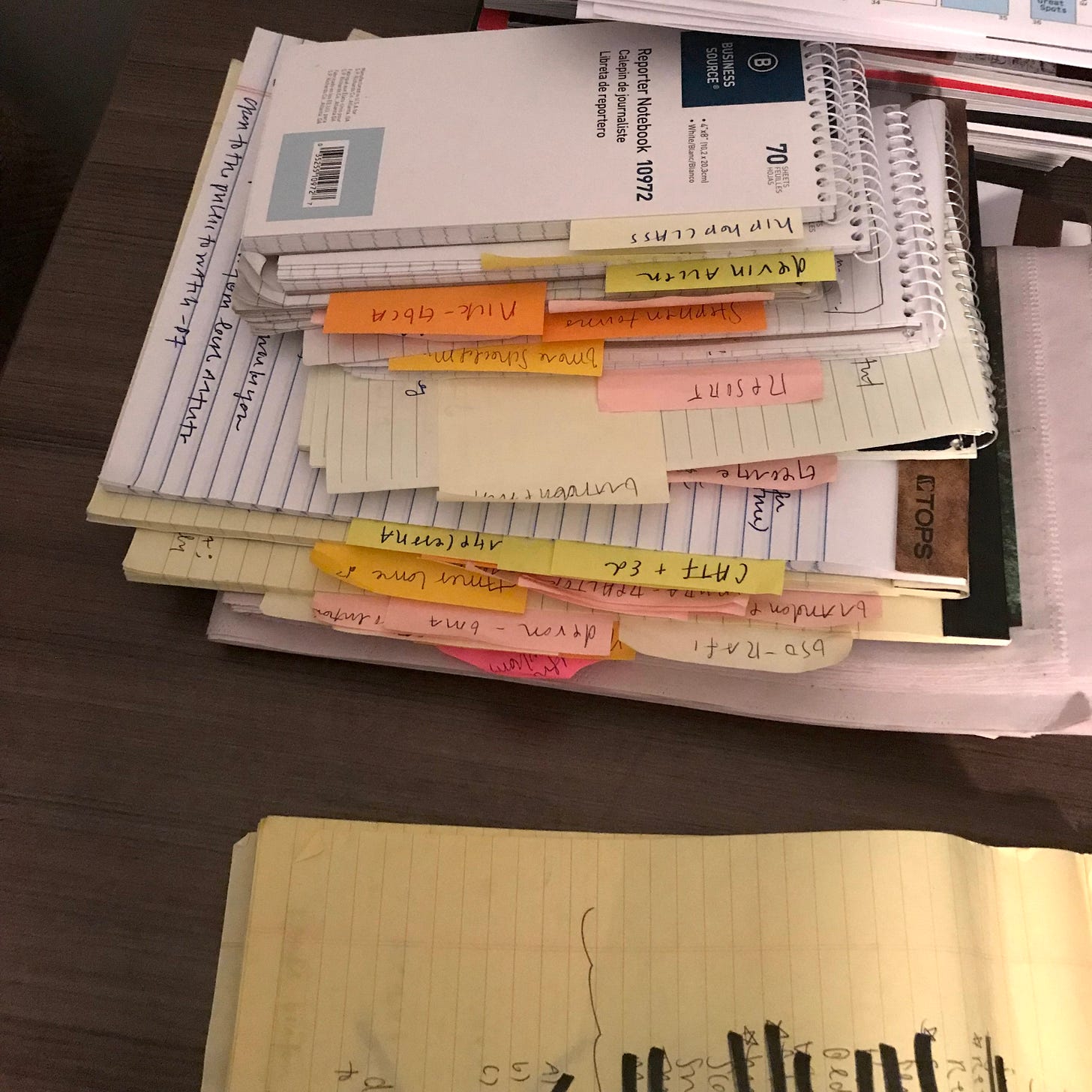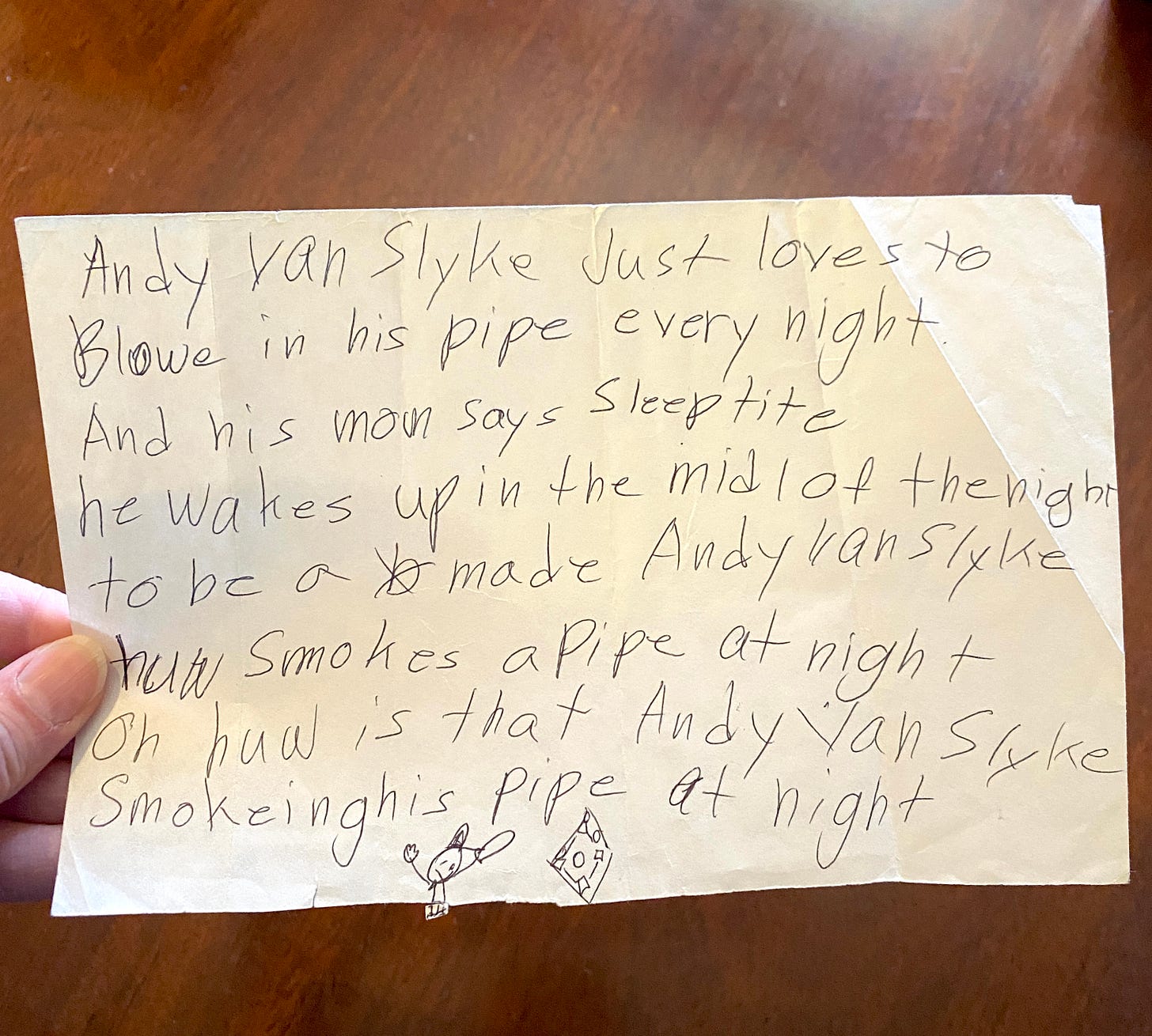FIND YOUR PEOPLE, FIND YOURSELF
A three-part series in understanding my creative identity / brushes with my former life / identity as
I’ve recently had a few brushes with my former life, for lack of a better word.
PART I
I found myself at a writers group recently, one I hadn’t been to in 20-odd years.
My high school English teacher has been running it for some time at her house in Hagerstown, and when I was still deep in the world of creative writing and fresh out of college, I started joining them each month to share whatever poetry I’d been working on. We wouldn’t so much critique or workshop but share and give (kind) feedback.
Then I became immersed in the world of journalism and, like anyone who has transitioned out of creative writing and into journalism (or marketing or, god forbid, tech writing) can tell you, it’s hard to go back to your roots. I’ve gone through the process of unlearning “creative writing” in order to learn a new way of delivering information and insight, so to then unlearn that while still producing it for my day job … it comes from two very different parts of the brain, and it’s not so easy to toggle off and on over a two-day weekend—or evenings.
But I showed up and immediate felt like I was among “my people,” even if they were about double my age and folks I’d never met. Each of us brought some pages to pass around and—and I’d totally forgotten this part—read out loud to the group.
But I’d also forgotten how beneficial that is. As I spoke my written words aloud, I heard things that should be changed.
Then another member offered to read my piece, a short poem, and I remembered, too, the value of hearing your piece being read by someone else.
A community of writers is so valuable for a writer—or generally finding a likeminded community for whatever artform you work in, especially if it’s a solitary one.
Despite the friends and great humans I’ve met in my nearly 20 years in journalism, I have never felt like journalists are “my people.”
PART II
A few weeks later, I found myself talking with a local author over lunch who has had a parallel 20-year career in editing and writing but for major publishing houses. I’ve always been fascinated by the world of book publishing and how it feels like a sister field to journalism but really has no overlap. How do you get *in*? (Spoiler alert: You move to New York City.)
Out of curiosity about that “other world,” I asked this author if she gave workshops locally. She said no but offered to meet me for lunch, to allow me to pick her brain.
After 90 minutes of conversation and really great Vietnamese food, I wasn’t left envying her career path but realizing my own career path was perfect for me. She had all the same headaches I do, she had the same struggle balancing her creative work with her day job, the pay is not great across the board, and so on. Her reality was not much different than my own.
She also felt like “my people.” Like a kindred spirit with the same sensitivities to life and gluten.
But what I saw so clearly was our distinction of character—how she “seemed” like a novelist, how her quiet, thoughtful persona emanated it—someone who sits in a room for months and works on writing a book or works with a team to create a storyline for a book series to be written by others.
I don’t know that I could sit down and write a novel start to finish if my life depended up on it. I thrive on shorter-span pieces, and I also love connecting with lots of people and the local arts community, cycling through ideas on a weekly deadline, working with first-time freelancers, conceptualizing cover stories and images and themed issues (I’m referring to my day job as editor of 72 Hours in Frederick, Maryland). I don’t have the desire or the attention span to write a novel. I create zines and workbooks—things that can be made in a day or a weekend. I am and have always been an essayist, a writer in short spurts. And my day job is the perfect fit for me.
PART III
When I was asked recently to speak at a Maryland Writers Association meeting, I said yes only because it terrified me. Public speaking—or performing in front of a group in any capacity—is kind of my worst nightmare. I am much happier working quietly behind the scenes or in one-on-one exchanges.
But I looked at it as a personal challenge and something I wanted to overcome.
I thought the talk I’d signed up to give was 20 minutes. I was, in fact, 90 minutes. They wanted me to talk for NINETY MINUTES.
I might have over-prepared. I was going to talk to a group of creative writers, novelists, and poets about side hustles—namely, freelancing for newspapers and magazines and also my journey as a freelancer and the many streams of income I was able to procure to make ends meet (editing, writing, marketing … running an online herb shop from New Mexico … ).
I brought handouts and copies of 72 Hours and anxiety to spare. When I arrived, I saw people seated and realized I was probably expected to stand in front of the group—because isn’t this what normally happens? That felt odd, so I grabbed myself a chair—and a big table—and sat down, as if a teacher behind a desk.
What I found was a group of people who, again, were “my people.” Writers, thinkers, curious, engaging. It was inspiring. I tried to leave them with as many useful tips and resources as I could from someone whose knowledge base is now this.
I also met another kindred spirit, a woman who grew up two blocks from my dad’s apartment in Pittsburgh, a lifelong traveler, a writer, so simpatico.
I left feeling relieved that it was over and decided I was glad to have had the experience but would probably never do that again.
And then a few days later, I was asked to give two more talks—but to a totally different audience. Gardeners. About making herbal medicine.
And without hesitation, I agreed.
Maybe I will find even more of “my people” there.
•••
AN ASTROLOGICAL NOTE:
Pluto transiting through Aquarius is all about finding—or rediscovering or redefining—who “your people” are … to create community, to do it together through mutual support. This transit just started a few months back and will be with us for the next 20 years. If you are familiar with your natal chart, Pluto will be transforming a particular area of your life over these years, determined by which house Aquarius was in when you were born.
*photo from 🌵
SOME PRACTICES FROM THE ARCHIVE———FOR GETTING CLEAR
SETTING OUT TO ACCOMPLISH NOTHING
I read Susun Weed’s book “Breast Cancer? Breast Health!” 20+ years ago and something, maybe the only thing, that I still remember was each time she outlined the steps to take upon receiving a cancer diagnosis, step one was always: Do nothing.
How to create spaciousness anywhere
It’s difficult to explain the energy of the East—Maryland, specifically—to someone who has spent most of their life here. It’s denser, I will say, after spending years out West. People seem to be in a rush, more stressed, and there’s just generally more tension. Driving (anywhere, really…
✴ When have I felt most “seen” or understood by others?
✴ Who do I feel most like myself around? What do they bring out in me?
✴ What shared interests, values, or beliefs matter most to me in community?
✴ What kinds of conversations energize and inspire me?
✴ What roles do I naturally take on in groups?
✴ Are there parts of me I hide in most social settings?
✴ Where do I feel most comfortable meeting new people (online, events, nature, workshops, etc.)?
✴ If I created a gathering for “my people,” what would it look like? What would we do, talk about, share?
✴ What types of communities or spaces have I been curious about but haven’t explored yet?
✴ What could I start sharing more of to magnetize the kind of connections I want?
✴ What does my ideal day look like with “my people” in it?














You never cease to amaze or encourage since Iv